


Poland quickly became a leading choice for companies looking for dedicated software development teams. Poland is a magnet for global enterprises thanks to its strong infrastructure, healthy business environment, and dynamic digital sector. Poland performs highly on international technology and innovation rankings. It has the most significant IT talent pool in Central and Eastern Europe, with over 525000 ICT professionals. Furthermore, since 2022, Poland has welcomed 35.2% of Ukrainian developers who have relocated to Europe, expanding its remarkable talent pool.
The global demand for qualified developers has reached critical levels, with the United States alone expected to face a 1.2 million engineer shortage by 2026. In contrast, Poland’s IT sector remains strong, with seven major tech hubs collectively employing over 85% of the country’s IT professionals. Polish developers are known for their technical expertise, fluency in English, and familiarity with western work cultures. Their knowledge varies according to their specialization, which includes frontend and backend development, cloud computing, and a variety of computer languages.
Poland’s competitive labor costs make it an even more appealing destination for businesses looking to fill tech talent gaps efficiently. In this article, we’ll look at why Poland has become a global IT powerhouse, the benefits and drawbacks of working with its developers, and information on software engineer salaries to help you decide whether Poland is a good fit for your tech employment needs.
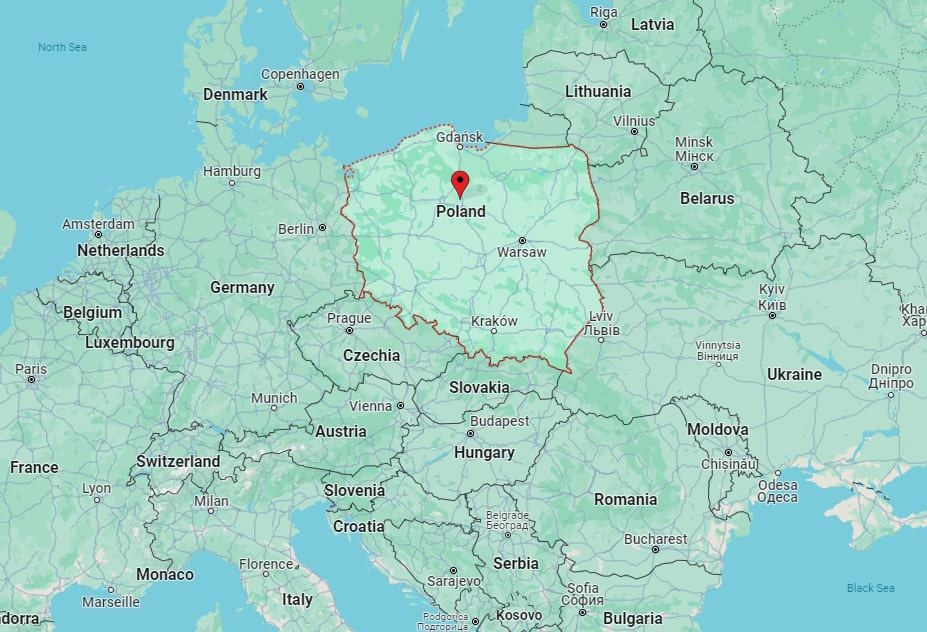
Poland has created a thriving digital industry by focusing strategically on education and making significant tech investments.
The tech sector is an important part of Poland’s economy and a key driver of its global reputation. Poland’s ICT services have increased, accounting for approximately 8% of the country’s GDP. Exports totaled $10 billion in 2021 and are expected to reach $13 billion by 2026. IT outsourcing alone contributed $2.56 billion in revenue in 2023, making Poland Europe’s seventh-largest and third-most competitive IT sector.
Nearly 60000 software businesses operate in the country, with over 1700 offering services such as business process outsourcing (BPO), shared services centers (SSC), global business services (GBS), information technology, and research and development (R&D). Its startup scene is flourishing, with a technology ecosystem worth €36.8 billion. LiveChat, Brainly, CD Projekt Red, Allegro, and DocPlanner are prime examples of this achievement, with Polish businesses raising €448 million in the first half of 2022 alone.

The backbone of Poland’s thriving tech industry is its exceptional talent pool. Ranked #5 in Europe for talent quality and competitiveness in 2024 by Emerging Europe, Poland’s success stems from its world-class education system and emphasis on tech skill development. Skilled developers play a pivotal role in this ecosystem, with many employed in SSCs and GBS (41%) and IT centers (22.6%), underscoring the country’s strong position as a regional tech leader.
Poland’s software development market is more than a growing industry—it’s a hub of innovation, talent, and opportunities.
Poland has emerged as a significant software development hub, providing a unique combination of technological expertise, a business-friendly environment, and cultural alignment with western markets. Polish developers account for a quarter of Europe’s talent pool and consistently rank highly in technical expertise evaluations. The demand for team growth in Poland is increasing, as 62% of all software generated is exported, mainly to Western Europe. This robust ecosystem makes Polish software engineers preferred by global firms looking for competent and dependable employees.
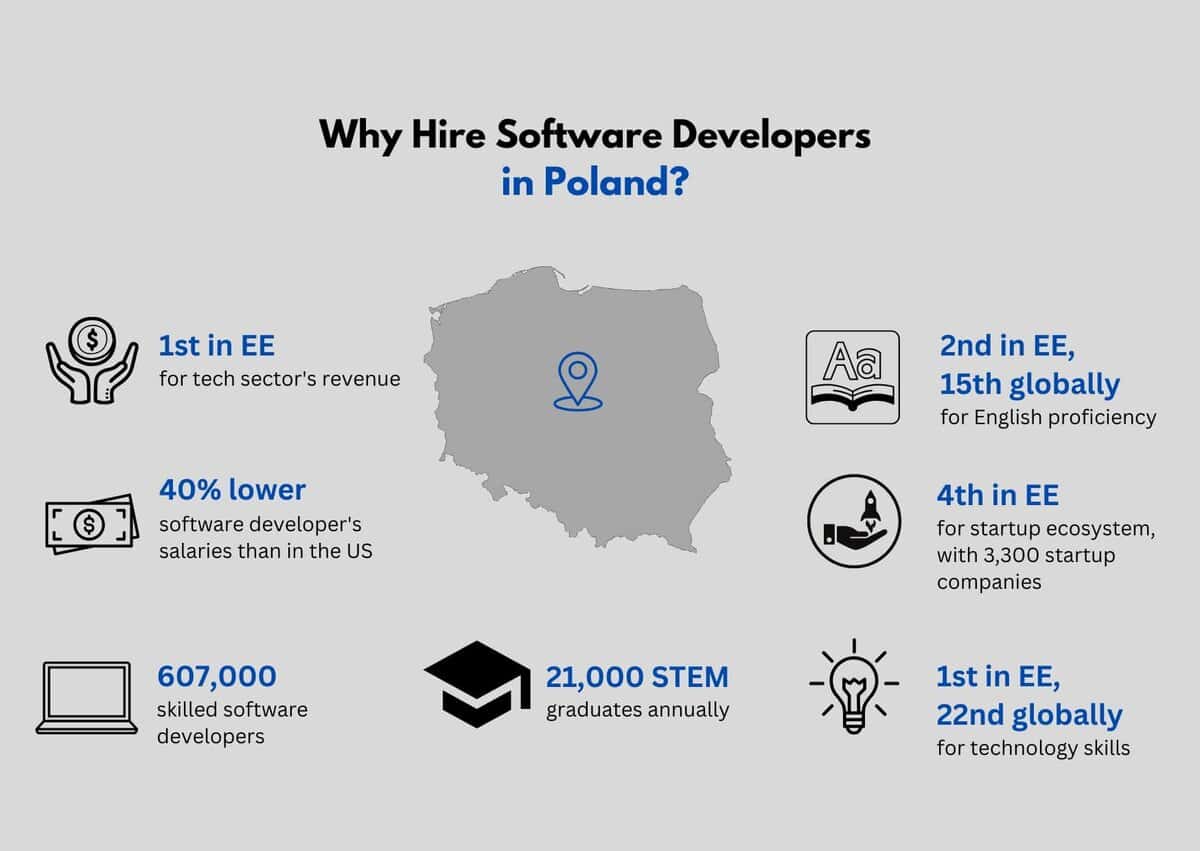
Poland is home to several renowned universities that excel in STEM education, offering comprehensive programs in computer science, engineering, and applied sciences. These institutions blend cutting-edge research with strong industry partnerships, equipping the next generation of software developers with critical skills. This emphasis on STEM education plays a key role in fueling Poland’s software development sector and enhancing its global competitiveness.
Poland’s highly technical education system has deep historical roots. During the Cold War, Soviet Union leaders prioritized the development of strong technical talent in countries bordering Germany, including Poland, to compete with the United States in areas such as mathematics, physics, and engineering. As a result, Poland’s universities established a rigorous STEM curriculum, fostering world-class experts in computer science, artificial intelligence, and software development—a legacy that continues to shape Poland’s highly skilled tech workforce today.
According to the QS World University Rankings 2024, Poland is home to several prestigious institutions recognized for their academic excellence. Among them, the top three universities for IT and computer science programs are:
The University of Warsaw serves over 34000 students and offers advanced IT programs, including Computer Science, Data Science, Cybersecurity, Artificial Intelligence, and Software Engineering. As Poland’s leading AI hub, the university has produced some of the world’s most influential AI researchers, with many graduates contributing to the development of OpenAI’s ChatGPT, including its current Chief Scientist, Jakub Pachocki. This deep-rooted expertise in AI solidifies the University of Warsaw’s reputation as a breeding ground for top-tier AI specialists, while its interdisciplinary approach enables students to integrate IT with business, finance, and engineering, preparing them for diverse careers in tech, research, and innovation.
Situated in Krakow, this historic university also has 34000+ students and stands out for its strong IT curriculum. In addition to core specializations like Computer Science and Software Engineering, it offers niche fields such as Bioinformatics, which bridges computing and life sciences—an increasingly valuable area in the tech industry. The university fosters international partnerships and research collaborations, ensuring students gain exposure to global trends and emerging technologies.
Known for its engineering-driven approach, this institution educates over 23000 students in IT disciplines, emphasizing computer science, software development, and cutting-edge technological applications. Its close ties with the industry provide students with hands-on experience and research opportunities in AI, machine learning, and cybersecurity. With a reputation for technological innovation and practical training, graduates from this university are highly sought after in Poland’s growing tech sector.
This strong educational foundation contributes to Poland’s reputation as a top destination for businesses seeking dedicated development teams. With approximately 75000 students enrolled in IT and ICT degree programs and about 20000 new graduates entering the labor market annually, Poland boasts a tech talent pool exceeding 600000 professionals. Polish developers are consistently ranked among the best worldwide, securing 3rd place on HackerRank’s Best Developers list. This vibrant ecosystem of universities and experienced engineers enables Poland to handle complex and innovative projects, making it a leading choice for companies aiming to stay competitive in the global market.
Polish developers are highly skilled and proficient in English, making them an excellent fit for Western businesses. According to the EF English Proficiency Index, Poland ranks 13th in Europe and 15th globally in English proficiency, as well as 2nd in Eastern Europe. Beyond language skills, Polish professionals share a similar work culture with Western companies, characterized by reliability, a strong work ethic, and collaborative problem-solving abilities.
Poland has several major IT hubs: Warsaw, Krakow, Wroclaw, and the Tri-City area (Gdansk, Gdynia, and Sopot). These cities employ over 73% of the country’s IT professionals and attract numerous international companies. They offer access to a highly skilled talent pool, prestigious technical universities, a competitive price-to-quality ratio, and favorable business conditions.
Warsaw: Poland’s capital and business center, Warsaw, hosts over 163000 IT specialists and 330 software company offices. Major players like Microsoft and Google have established development centers here, making it a prime location for R&D branches and software teams.
Krakow: As Poland’s second-largest IT hub, Krakow has a thriving tech ecosystem with over 500 development offices, including 40 recent openings. Home to 261 business centers, it’s a popular choice for startups and R&D, attracting major companies like Cisco and Motorola.
Wroclaw: Known for AI, Big Data, and IoT expertise, Wroclaw features over 100 IT and R&D centers and collaborates with 27 universities. Its large talent pool and strong university links make it a tech hotspot.
Tri-City: A rapidly growing region with 73500 developers and a 12.6% annual employment growth rate. Its geographical proximity makes it a popular nearshoring location for Nordic businesses, solidifying its status as an important IT hub in Poland.
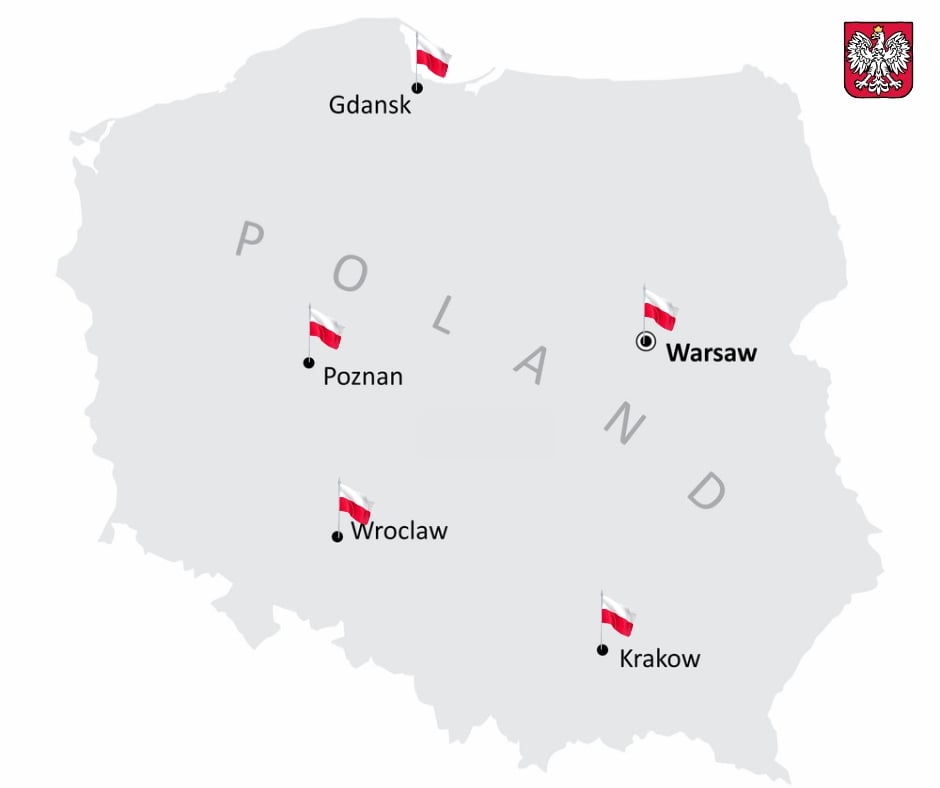
Poland’s well-developed transportation network makes collaboration between its major IT hubs highly efficient. High-speed trains and express intercity connections ensure professionals can travel quickly and comfortably between Warsaw, Krakow, Wroclaw, and Gdansk.
For example, a high-speed Pendolino train from Warsaw to Krakow takes just 2.5 to 3 hours, making it possible for tech professionals to work in one city and commute to another for meetings or networking events. Similarly, the Warsaw-Gdansk route takes approximately 3 hours, offering a convenient link between Poland’s capital and the dynamic Tri-City IT sector.
Train travel times between major IT hubs in Poland
| Route | Travel Time (Approx.) | Train Type |
|---|---|---|
| Warsaw → Krakow | 2.5 – 3 hours | High-Speed (Pendolino) |
| Warsaw → Gdansk | 3 – 3.5 hours | High-Speed (Pendolino) |
| Warsaw → Wrocław | 3.5 – 4 hours | Express InterCity (EIC) |
| Krakow → Wrocław | 3 – 3.5 hours | Express InterCity (EIC) |
| Krakow → Gdansk | 5.5 – 6 hours | Express InterCity (EIC) |
The short travel times between Poland’s key tech cities enable companies to tap into multiple talent pools while maintaining efficient operations. Whether establishing satellite offices or hiring remote teams, Poland’s fast and cost-effective transportation allows businesses to expand strategically without logistical barriers.
Do you have IT recruitment needs?
Poland has a stable political environment, EU membership, and a strong economy, making it a welcoming and appealing location for international firms. Its well-developed IT infrastructure, adherence to strict data protection requirements such as GDPR, and strong intellectual property rights create a secure and dependable corporate environment.
Poland offers several government initiatives to support innovation and business growth. The R&D Tax Relief allows for up to a 100% deduction on eligible R&D costs, stimulating innovation. The standard corporate tax rate is 19%. However, startups and small enterprises pay a lower 9% rate. Furthermore, the IP Box provides a preferential 5% tax rate on income from intellectual property rights, while the Polish Investment Zone offers CIT exemptions for up to 15 years on new investments. These financial benefits make Poland an appealing location for outsourcing and building R&D centers.
Beyond these national initiatives, Poland is currently experiencing a wave of European Union grants to boost technology ventures, particularly in AI and software development. These grants provide non-dilutive funding, allowing startups and tech companies to scale operations, invest in R&D, and accelerate growth.
Several EU-backed programs support projects in:
For businesses looking to navigate grant applications and maximize funding, DevsData LLC can connect you with specialized grant consulting firms that assist in securing EU funding. Additionally, they work with experienced local legal experts who ensure compliance with corporate regulations, intellectual property laws, and EU financial requirements.
In addition to its business-friendly policies, Poland is recognized as one of the safest countries in Europe. According to Numbeo’s 2024 Safety Index, Poland ranks significantly higher than many other European nations:
| Country | Safety Index 2024 |
|---|---|
| Poland | 69.3 |
| Germany | 61.1 |
| France | 44.7 |
| Sweden | 51.6 |
Warsaw, in particular, reports lower crime rates than cities like Berlin, Paris, and Stockholm, reinforcing Poland’s reputation as a safe and stable environment for businesses and employees.
Why this matters:
These financial incentives, EU funding opportunities, and Poland’s reputation for safety, combined with its strong tech talent and business-friendly policies, make it a top destination for international tech firms seeking to expand and innovate in a cost-effective yet high-quality environment.
According to a CEE 2022 Report, Poland’s tech ecosystem is valued at €36.8 billion, with startups raising €448 million in the first half of 2022 alone. This dynamic ecosystem promotes innovation and draws both local and international talent.
Several Polish startups have gained global recognition for their innovative solutions.
Polish developers are proficient in various programming languages, including Java, .NET, C++, Python, and JavaScript, with expertise spanning backend, frontend, and full stack development. They are highly skilled in software engineering practices like agile methodologies, DevOps, and CI/CD, ensuring efficient and effective development cycles.
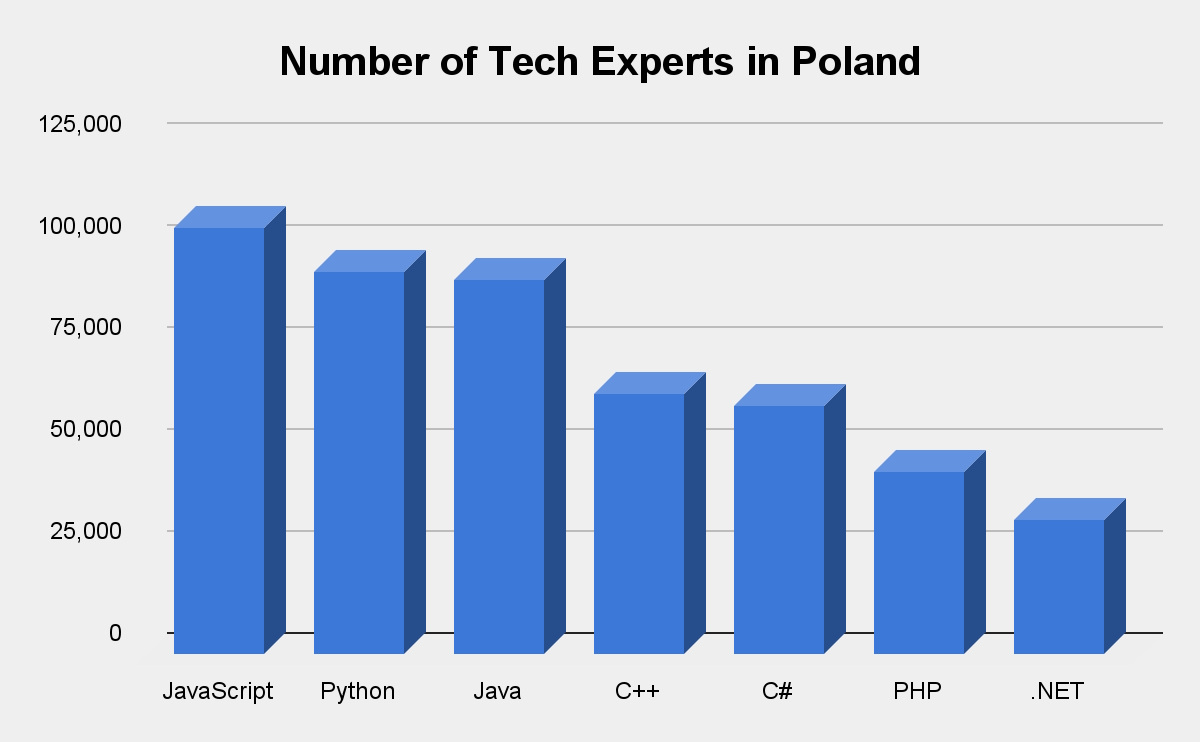
In addition to traditional software development, many Polish developers specialize in cloud technologies, such as AWS, Azure, and Google Cloud, and are competent in cloud architecture design, migration, and management. They also focus on emerging fields such as data analytics, big data, and machine learning, combining advanced practical skills with cutting-edge data processing and analysis tools. With a growing emphasis on cybersecurity, Polish developers deliver functional, innovative, and secure solutions.
Working with Polish software developers comes with some challenges that businesses should be aware of. Here’s a breakdown of the potential obstacles and how to properly overcome them:
Poland ranks 4th in Europe for business complexity, according to the 2023 Global Business Complexity Index. Companies face challenges such as:
To overcome these difficulties, it is essential to consult with experienced legal and tax advisors or partner with reliable service providers to ensure compliance and smooth operations.
Hiring software developers in Poland requires navigating different types of employment contracts, each with its own implications:
As of 2023, 51% of IT professionals in Poland work under UoP contracts, while 37% prefer B2B agreements, reflecting the growing dominance of the B2B model due to its flexibility and cost efficiency.
Poland operates on Central European Time (CET), 6-9 hours ahead of the continental United States. This time difference might create issues such as:
However, many companies have turned this challenge into an advantage by implementing a “round-the-clock” work strategy. Polish developers can complete tasks during their workday, allowing United States-based teams to review and continue the work as their day begins, thereby accelerating product development.
| Location | Time Zone Difference |
|---|---|
| Berlin | Warsaw is in the same time zone as Berlin. |
| London | Warsaw is 1 hour ahead of London. |
| Austin | Warsaw is 7 hours ahead of Austin. |
| Chicago | Warsaw is 7 hours ahead of Chicago. |
| San Francisco | Warsaw is 9 hours ahead of San Francisco. |
| New York | Warsaw is 6 hours ahead of New York. |
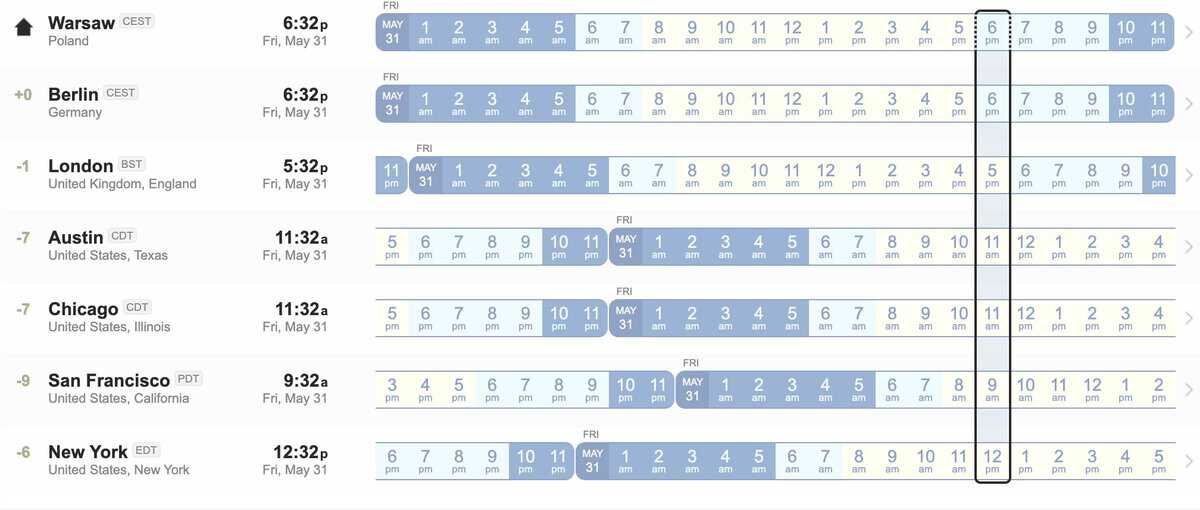
For a more in-depth comparison, click the link.
In addition to its favorable time zone for European collaboration, Poland is also highly accessible from major business hubs worldwide. The table below provides an overview of flight durations from key cities:
| City | Flight Duration to Warsaw |
|---|---|
| Berlin | 1 hour 12 minutes |
| Stockholm | 1 hour 30 minutes |
| Munich | 1 hour 30 minutes |
| Paris | 2 hours 12 minutes |
| London | 2 hours 30 minutes |
| Tel Aviv | 4 hours |
| New York | 9 hours |
| Chicago | 9.5 hours |
| Miami | 11 hours |
| Austin | 12 hours |
| San Francisco | 13 hours |
While time zone differences with the US require strategic planning, Warsaw’s short flight times to other European business hubs make it an ideal location for collaboration with software engineers. Its global connectivity ensures teams can easily travel for meetings, conferences, or business expansion. Understanding these factors ensures smooth collaboration with Polish developers while leveraging Poland’s excellent tech talent and accessibility.
Do you have IT recruitment needs?
This Poland Salary Calculator is a valuable tool for understanding earnings in Poland, where factors like tax rates, social security contributions, and contract types impact take-home pay. Poland’s progressive tax system applies a 12% rate to annual earnings up to PLN 120000 (USD 29005) and 32% for higher incomes. Freelancers and those on business-to-business (B2B) contracts must also consider VAT, business expenses, and other deductions.
These calculators simplify salary estimates, helping professionals and businesses compare job offers, negotiate pay, and plan finances. They also offer valuable insights into labor costs, reinforcing Poland’s appeal as a cost-effective yet competitive market for software development.
Poland remains an attractive hub for IT professionals, offering competitive salaries while being cost-effective for global businesses. The latest JustJoinIT 2025 Report provides key insights into salary trends for junior, mid, and senior developers, highlighting differences between UoP (employment contract) and B2B (freelance) agreements.
| Seniority Level | UoP Salary (PLN) | UoP Salary (USD) | B2B Salary (PLN) | B2B Salary (USD) | Expected Salary (PLN) | Expected Salary (USD) |
|---|---|---|---|---|---|---|
| Junior | 7800 | $1895 | 9125 | $2218 | 10000 | $2430 |
| Mid | 14750 | $3584 | 18000 | $4374 | 15000 | $3645 |
| Senior | 20400 | $4957 | 24360 | $5920 | 25000 | $6075 |
Note: USD amounts are approximate. Exchange rates may vary over time.
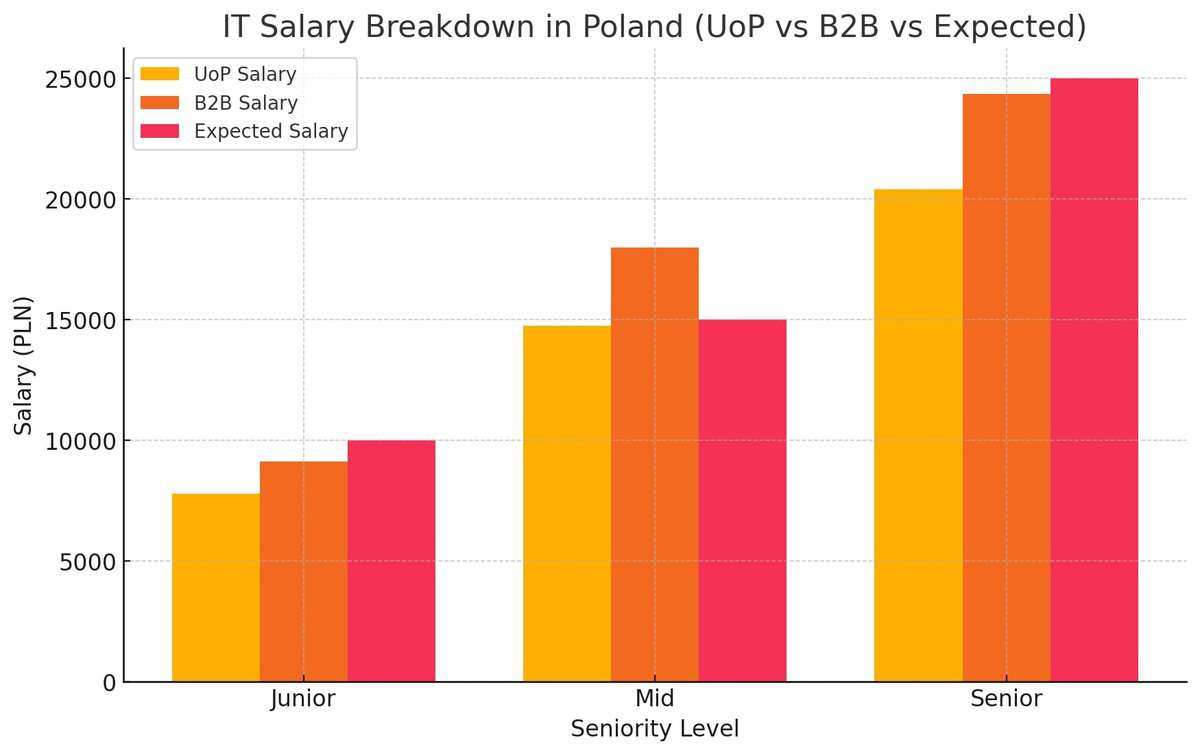
The IT Salary Breakdown table above provides insights from the JustJoinIT 2025 Report, reflecting median salaries for Polish developers at different experience levels. These figures are based on actual job offers and contracts, accounting for standard employment terms in Poland and covering various tech roles.
In Poland, senior software developers earn an average annual salary of $22740, significantly lower than their US counterparts, who typically make around $130170 per year. On average, Polish developer salaries are approximately 2.5 times lower than those in the United States, making Poland a cost-effective option for American companies looking to reduce development costs without compromising quality.
Despite lower salary levels, compensation for Polish developers has steadily increased, reflecting rising demand for skilled IT professionals. This trend highlights Poland’s rapidly expanding tech sector, where competitive wages and growing career opportunities continue to attract top talent. In major IT hubs such as Warsaw, Krakow, and Wroclaw, salaries tend to be higher due to local cost-of-living variations and stronger demand for expertise.
Across Europe, significant salary disparities exist between Western and Eastern regions. Western European developers typically earn over $40000 annually, while those in Eastern Europe average around $20000 or more. In Southern Europe, developers in Spain, Italy, Portugal, and Greece earn between $21300 and $36300 per year.
Poland’s cost-efficiency and its growing prominence in the tech industry position it as a prime destination for companies looking to establish or expand their software development teams. The table below provides a detailed breakdown of salaries for various tech roles in Poland, emphasizing its competitive yet cost-effective IT market. The table below shows the average annual salaries for senior-level software developers in Poland vs. the United States. The following chart visually represents these differences across key tech roles:
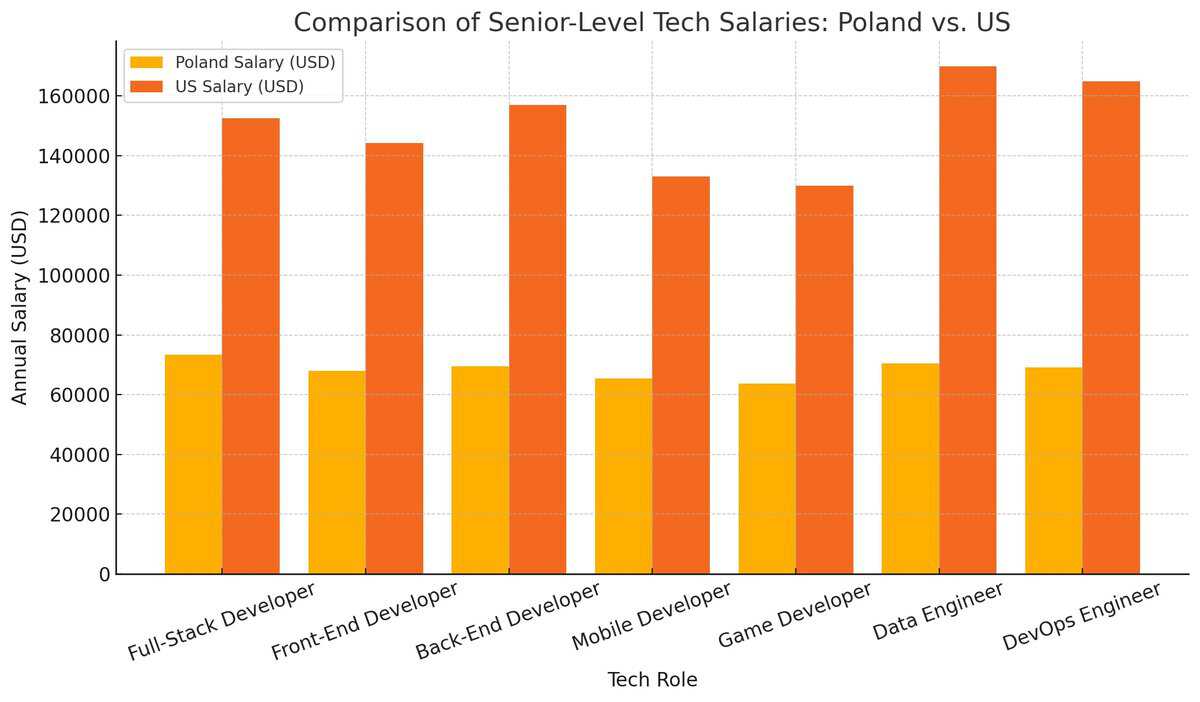
| Seniority Level | Expected Salary (PLN) | Expected Salary (USD) |
|---|---|---|
| Full-Stack Software Developer | $73250 | $152500 |
| Frontend Software Developer | $68000 | $144250 |
| Backend Software Developer | $69500 | $157000 |
| Mobile App Developer | $65500 | $133000 |
| Game Developer | $63750 | $130000 |
| Data Engineer | $70500 | $170000 |
| DevOps Developer | $69000 | $165000 |
For detailed insights, consider exploring resources like Plane or Levels.fyi.
According to a Bulldogjob survey, the Polish IT workforce is predominantly young and dynamic, with over 57% of professionals aged 25–34. Nearly half of all IT specialists (47%) are concentrated in major tech hubs like Warsaw, Krakow, and Wroclaw. A strong emphasis on education is evident, as 56% hold a bachelor’s or master’s degree in STEM fields. The workforce is divided between local and international companies, with 53% working for Polish firms and 43% employed by foreign businesses.
This chart illustrates the key factors that Polish software developers consider when choosing a job and the percentage of respondents who prioritize each factor.
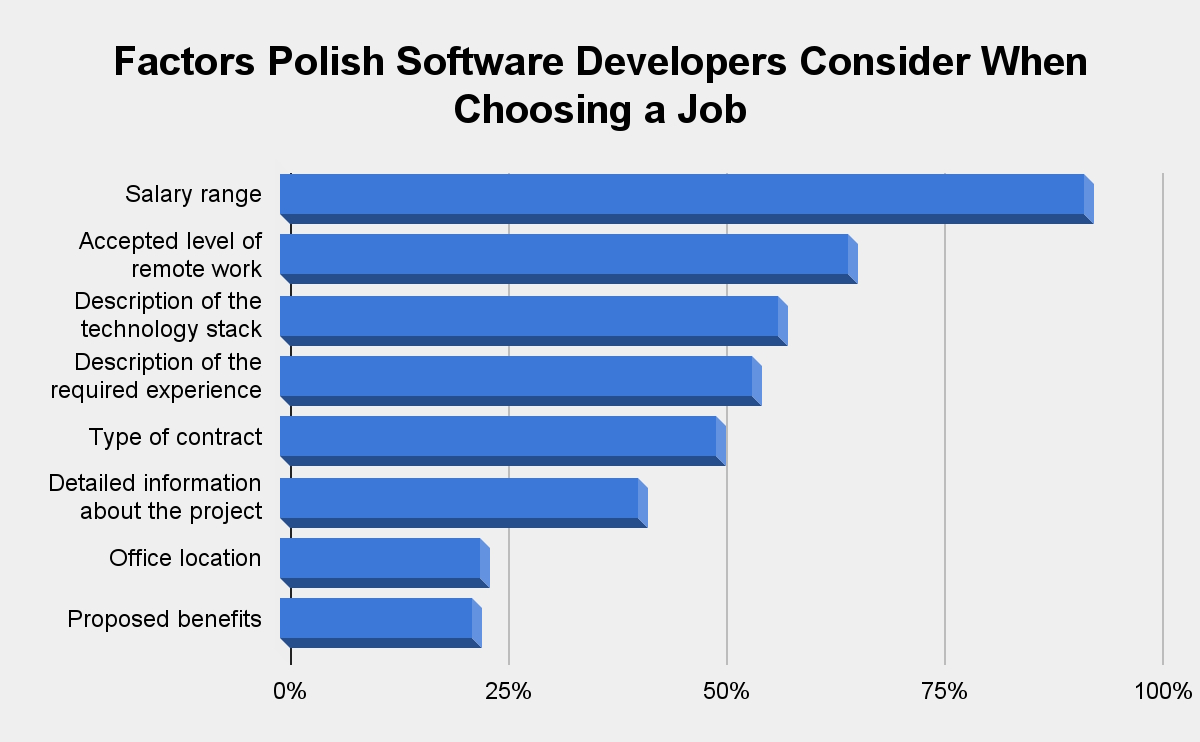
Over 78% of Polish software engineers work in Middle, Senior, Lead, Manager, or C-level jobs. As a result, the country is an ideal location for hiring top-tier personnel. The survey also found that 91% of developers prefer remote or hybrid work arrangements, the second most crucial element in promoting long-term employment. A positive work environment, attractive compensation, opportunities for professional development, and job security are all essential factors in employee loyalty.
Polish developers value benefits and perks that enhance their work-life balance and career development. The most valued are a four-day workweek, workplace flexibility, additional days off, access to professional courses, and comprehensive medical insurance. These attributes make Polish software developers attractive to companies seeking skilled, motivated, and adaptable professionals.
Recruiting IT specialists from abroad can be challenging, especially if you need prior experience. To streamline the process and successfully expand your team by hiring Polish developers, follow this three-step guide:
Before hiring developers in Poland, thoroughly analyze the labor market. Choose a specific location and evaluate factors such as the talent pool, average salary expectations, competition for software professionals, market trends, infrastructure, and business climate. This groundwork will help you:
Clearly outline your job requirements before starting the recruitment process. Polish developers’ skills may vary depending on the role. For example, suppose you’re hiring a .NET developer. In that case, the candidate should have expertise in .NET, C# or VB.NET, .NET Framework, SQL Server, or MS SQL, and an understanding of software development cycles, testing principles, and patching processes. Specify the required level of expertise (junior, middle, or senior) to target candidates with the right experience and qualifications.
Once your preparation is complete, move on to candidate selection and interviews. Focus on the following during the interview process:
Ask questions that assess the candidate’s technical knowledge, teamwork abilities, problem-solving skills, and approach to project execution. Prepare a practical test assignment to evaluate their coding abilities and ensure they meet your expectations.
When hiring software developers in Poland, there are several approaches to consider, depending on your business needs and goals.
One option is to look into freelancing networks, where you can engage IT workers as independent contractors. This technique eliminates employment contract requirements and allows you to save money by paying hourly rates rather than additional fees such as social security. Freelancers are ideal for micro-startups or tiny technology enterprises that require short-term collaboration. However, freelancing may not be suitable for more focused, long-term development.
For businesses seeking a team of developers, partnering with a local outsourcing vendor in Poland can be an efficient solution. This model provides access to a vast pool of skilled software engineers at 1.5 to 2 times lower rates than in-house employees. It also eliminates the need for extensive recruitment efforts. However, outsourcing has drawbacks, including reduced control over the team, uncertain pricing practices due to ambiguous invoices, and significant intellectual property (IP) hazards without sufficient legal safeguards. This strategy is advantageous for non-tech enterprises where technology is not the primary product or service.
Working with a recruitment service provider is best if you want to build a dedicated development team in Poland while maintaining complete control. This strategy lets you handpick professionals with the expertise and abilities for your projects. You’ll also keep track of spending, protect your intellectual property rights, and personally manage the crew. Furthermore, recruitment firms can handle back-office activities, simplifying the management of your offshore crew and allowing for a smooth development process.
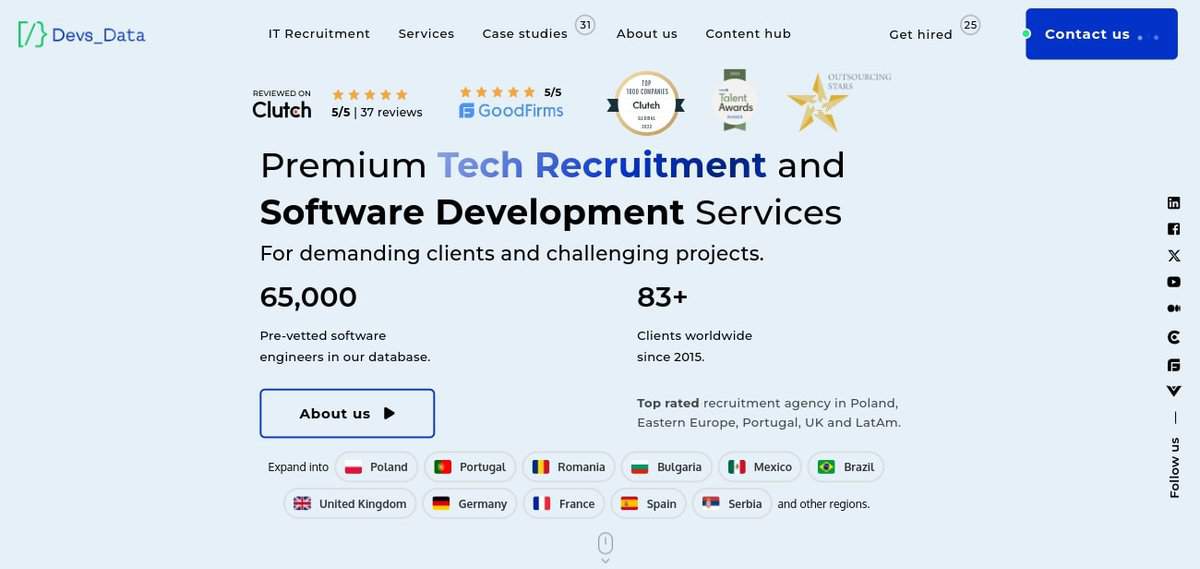
Website: www.devsdata.com
Team size: ~60 employees
Founded in: 2016
Headquarters: Warsaw, Poland and Brooklyn, NY
DevsData LLC is a globally recognized IT recruitment agency with over 8 years of experience, specializing in connecting businesses with top-tier tech talent. With a database of 65000 pre-vetted IT specialists, the company offers a rigorous hiring process, including a 90-minute problem-solving test conducted by Google-level engineers. This ensures that only the top 6% of candidates are matched with clients, guaranteeing technical excellence and outstanding communication skills. Officially licensed by the government to provide IT recruitment services, DevsData LLC operates on a success fee model with a guarantee period, delivering reliable results for businesses seeking dedicated development teams.
In addition to recruitment services, DevsData specializes in custom software development, focusing on AI, machine learning, and data science. With over 100 completed projects, the company has partnered with global corporations like Novartis and Cubus and startups in healthcare, eCommerce, and finance. The engineering team, composed of experts with Google-level experience, consistently delivers innovative solutions for clients.
With offices in key Polish cities—Warsaw, Krakow, Wroclaw, and Gdansk—DevsData LLC operates across Europe, Asia, North America, Latin America, and Australia. Serving over 80 clients worldwide, the company maintains a perfect 5/5 client satisfaction rating on Clutch and GoodFirms.
The company’s dual approach—offering recruitment and software development services—has earned it a strong reputation in the industry. One notable success story involved a financial institution that, after initially seeking just one developer, was so impressed with the talent pool that it hired four and set up a local engineering unit in Poland.
DevsData LLC is the preferred choice for companies building dedicated development teams. It combines recruitment with expert software development and offers a tailored, cost-effective approach. The company also provides legal and tax advisory services, Employer of Record (EoR) solutions, and Business Process Outsourcing (BPO) to streamline global operations.
Do you have IT recruitment needs?
For more information, contact DevsData LLC at general@devsdata.com or visit www.devsdata.com.
Poland offers a range of benefits that enhance the professional environment, promoting a healthy balance between work and personal life. These benefits play a crucial role in attracting and retaining top talent.
Renowned healthcare providers such as Luxmed, Enelmed, and Medicover offer extensive medical coverage, ensuring employees can access comprehensive healthcare services.
Polish labor law provides employees with at least 20 paid vacation days per year. For those with more than 10 years of combined work and study experience, this entitlement often increases to 26 days annually or more, depending on the employer’s policies.
Many companies in Poland emphasize employee well-being by offering gym memberships and wellness initiatives. The popular MultiSport card grants access to fitness facilities across various locations, encouraging a healthy and active lifestyle among employees.
Paying contractors in Poland requires careful navigation of local regulations to ensure compliance and efficiency. Here’s how to manage it effectively:
Using Employer of Record (EoR) services can simplify the process significantly. Companies like DevsData LLC, Deel, Remote, Plane, and Oyster HR specialize in managing Polish employment laws, ensuring smooth and compliant payment workflows.
DevsData LLC, our top choice, has a significant presence in Poland with offices in Warsaw, Krakow, Katowice, Gdansk, Poznan and Wroclaw. They offer extensive experience in EoR services, handling employment law issues, and providing HR advisory services for businesses looking to hire locally or set up operations in Poland. Their expertise extends to business process outsourcing (BPO) services, which can significantly improve operational efficiency and optimize corporate activities.
Platforms like Wise (formerly TransferWise) and Payoneer are excellent options for international fund transfers. They provide secure transactions, competitive exchange rates, and low fees, making them reliable solutions for global payments.
To call Poland from the US or Canada, begin by dialing 011, the international exit code. Follow this with 48, the country code for Poland. Next, enter the area code for the desired location, such as 22 for Warsaw. Finally, dial the local phone number. For example, to reach a number like 123 4567 in Warsaw, you would dial: 011-48-22-123-4567.
To call Poland from Australia, start by dialing 0011, the international exit code. Then, enter 48, Poland’s country code, followed by the relevant area code, such as 22 for Warsaw. Conclude by dialing the local number. For example, to reach 456 7890 in Warsaw, you would dial: 0011-48-22-456-7890. These steps ensure your call is successfully connected from Australia to Warsaw.
When calling Poland from the UK, begin by dialing 00, the international exit code. Next, enter 48, Poland’s country code, followed by the area code, such as 22 for Warsaw. Finish by dialing the local number. For instance, to contact 321 6547 in Warsaw, dial: 00-48-22-321-6547.
Alternatively, you can use online communication platforms like Skype or WhatsApp to make international calls. These options are often more cost-effective and widely used. For more information, refer to this article.
Do you have IT recruitment needs?
Polish software engineers are renowned for their attention to detail, adaptability, inventiveness, and responsiveness. With 40-70% lower salaries than in Western Europe or the US, they provide cost-effective solutions while maintaining strong business etiquette and clear communication. These qualities make them highly valued by international corporations. Defining your goals clearly and carefully choosing a professional is essential to engaging a reliable developer.
DevsData LLC, based in Poland, is a top choice for partnering with skilled developers. With over 8 years of experience and a database of 65000 IT professionals, they offer tailored solutions to meet clients’ unique needs. Their streamlined interview process helps them connect you with top talent in under 10 days, ensuring exceptional results.
For more information about DevsData LLC, contact them at general@devsdata.com or explore the opportunities within Poland’s dynamic tech ecosystem at www.devsdata.com.
DevsData IT Recruitment Agency Poland
Jerozolimskie 181B, 5th floor,
02-222 Warsaw, Poland
poland@devsdata.com
Frequently asked questions (FAQ)
DevsData – your premium technology partner
DevsData is a boutique tech recruitment and software agency. Develop your software project with veteran engineers or scale up an in-house tech team of developers with relevant industry experience.
Free consultation with a software expert
🎧 Schedule a meeting
FEATURED IN


DevsData LLC is truly exceptional – their backend developers are some of the best I’ve ever worked with.”
Nicholas Johnson
Mentor at YC, serial entrepreneur


 Build your project with our veteran developers
Build your project with our veteran developers
 Explore the benefits of technology recruitment and tailor-made software
Explore the benefits of technology recruitment and tailor-made software
 Learn how to source skilled and experienced software developers
Learn how to source skilled and experienced software developers




Categories: Big data, data analytics | Software and technology | IT recruitment blog | IT in Poland | Content hub (blog)
